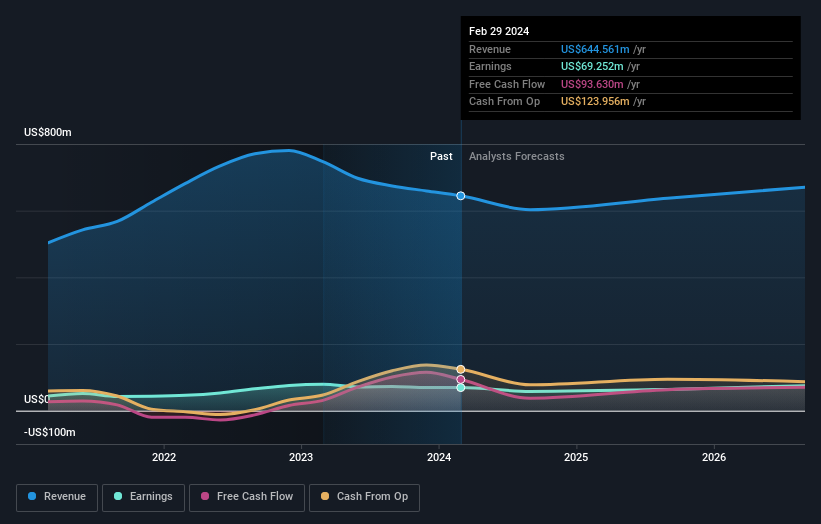Lindsay Corporation Just Beat EPS By 5.5%: Here's What Analysts Think Will Happen Next
Last week saw the newest quarterly earnings release from Lindsay Corporation (NYSE:LNN), an important milestone in the company's journey to build a stronger business. It looks to have been a bit of a mixed result. While revenues of US$152m fell 12% short of what the analysts had predicted, statutory earnings per share (EPS) of US$1.64 exceeded expectations by 5.5%. The analysts typically update their forecasts at each earnings report, and we can judge from their estimates whether their view of the company has changed or if there are any new concerns to be aware of. Readers will be glad to know we've aggregated the latest statutory forecasts to see whether the analysts have changed their mind on Lindsay after the latest results.
Check out our latest analysis for Lindsay
Taking into account the latest results, the four analysts covering Lindsay provided consensus estimates of US$603.1m revenue in 2024, which would reflect a noticeable 6.4% decline over the past 12 months. Statutory earnings per share are forecast to drop 17% to US$5.21 in the same period. Before this earnings report, the analysts had been forecasting revenues of US$672.7m and earnings per share (EPS) of US$5.87 in 2024. Indeed, we can see that the analysts are a lot more bearish about Lindsay's prospects following the latest results, administering a substantial drop in revenue estimates and slashing their EPS estimates to boot.
What's most unexpected is that the consensus price target rose 9.8% to US$134, strongly implying the downgrade to forecasts is not expected to be more than a temporary blip. The consensus price target is just an average of individual analyst targets, so - it could be handy to see how wide the range of underlying estimates is. The most optimistic Lindsay analyst has a price target of US$142 per share, while the most pessimistic values it at US$126. This is a very narrow spread of estimates, implying either that Lindsay is an easy company to value, or - more likely - the analysts are relying heavily on some key assumptions.
Of course, another way to look at these forecasts is to place them into context against the industry itself. We would highlight that revenue is expected to reverse, with a forecast 12% annualised decline to the end of 2024. That is a notable change from historical growth of 11% over the last five years. By contrast, our data suggests that other companies (with analyst coverage) in the same industry are forecast to see their revenue grow 3.4% annually for the foreseeable future. So although its revenues are forecast to shrink, this cloud does not come with a silver lining - Lindsay is expected to lag the wider industry.
The Bottom Line
The most important thing to take away is that the analysts downgraded their earnings per share estimates, showing that there has been a clear decline in sentiment following these results. On the negative side, they also downgraded their revenue estimates, and forecasts imply they will perform worse than the wider industry. There was also a nice increase in the price target, with the analysts clearly feeling that the intrinsic value of the business is improving.
Keeping that in mind, we still think that the longer term trajectory of the business is much more important for investors to consider. We have forecasts for Lindsay going out to 2026, and you can see them free on our platform here.
Another thing to consider is whether management and directors have been buying or selling stock recently. We provide an overview of all open market stock trades for the last twelve months on our platform, here.
Have feedback on this article? Concerned about the content? Get in touch with us directly. Alternatively, email editorial-team (at) simplywallst.com.
This article by Simply Wall St is general in nature. We provide commentary based on historical data and analyst forecasts only using an unbiased methodology and our articles are not intended to be financial advice. It does not constitute a recommendation to buy or sell any stock, and does not take account of your objectives, or your financial situation. We aim to bring you long-term focused analysis driven by fundamental data. Note that our analysis may not factor in the latest price-sensitive company announcements or qualitative material. Simply Wall St has no position in any stocks mentioned.

